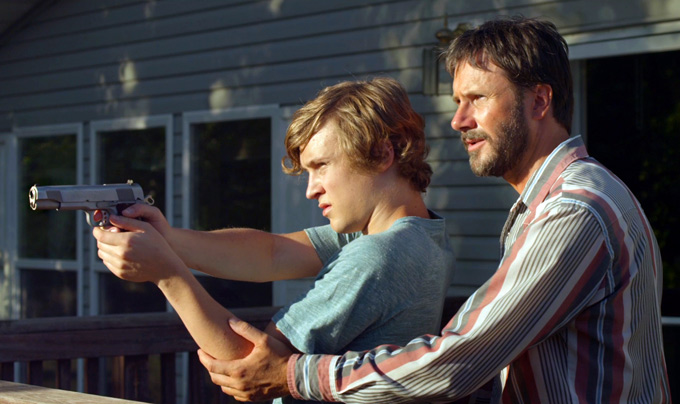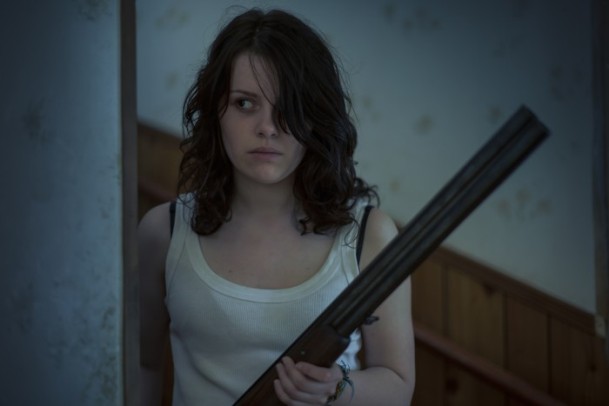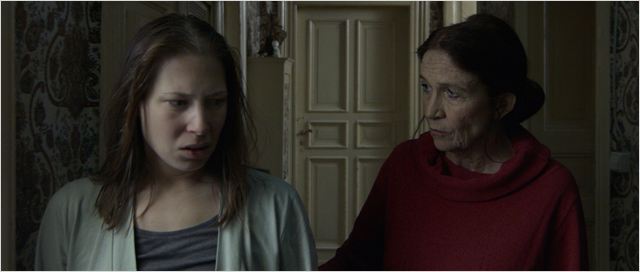London Film Festival 2015: Who Dares Wins? | reviews, news & interviews
London Film Festival 2015: Who Dares Wins?
London Film Festival 2015: Who Dares Wins?
Different sorts of daring during the LFF's first half

How do you corral 250 films in a way which makes sense to potential viewers? Major releases – so far at this year’s LFF we've had Suffragette, Johnny Depp in Black Mass and Maggie Smith in The Lady in the Van – pretty much take care of themselves. For the mostly unknown rest, festival director Clare Stewart introduced themed strands in 2012 with the stated aim of making the festival “much easier to navigate”.
It’s a small loss for people like me who partly choose films to see what’s happening in countries we like, and one of the LFF’s pleasures is seeing London’s hundreds of national communities turning out for tastes of home, and berating the director afterwards if they don’t appreciate what they see. Mostly, like other Stewart changes, the themed strands have refreshed the festival. Follow the LFF through one thread to this halfway point, though, and some arbitrariness is obvious.
Dare braces you for a barrage of films by Pasolini, Abel Ferrara and Gaspar Noe, the sort of no-holds-barred, pumping blood-rush you used to get at London cult sanctuary the Scala. The presence of Ken Russell’s Women in Love, with its notorious nude Alan Bates-Olly Reed wrestling bout, reminds you what the term used to mean (and is one of the scattered archive Treasures, which really did make more sense in their own slot). Dread might be a more useful term, the sort of feeling you don’t exactly seek in the cinema, but never forget once you’ve found it. Of the films I’ve seen so far, a couple qualify.
 Matt Sobel’s debut Take Me to the River is reminiscent of a sweaty treat from last year’s LFF, Josephine Decker’s Thou Wast Mild and Lovely, with its basic scenario of an outsider falling foul of poisonous country customs. For gay Californian teenager Ryder (Logan Miller), though, his own family are the source of twisted fear and loathing. Arriving for a reunion with his mum’s Nebraskan clan, there are moments of sharply comic culture clash, as Ryder wanders the farm in his funky sunglasses and bright, short shorts, to the disgust of the men-folk and adoration of his pre-teen, female cousins. Mum Cindy’s command to keep his sexuality secret to keep the peace is, though, a distraction from the farm’s real hornet’s nest, maliciously poked by her brother Keith (Josh Hamilton, pictured above right with Logan Miller) via his nine-year-old daughter, a giggling, terrifying, seeming Lolita who snares Ryder in scenarios of apparent molestation his unspoken sexuality makes impossible.
Matt Sobel’s debut Take Me to the River is reminiscent of a sweaty treat from last year’s LFF, Josephine Decker’s Thou Wast Mild and Lovely, with its basic scenario of an outsider falling foul of poisonous country customs. For gay Californian teenager Ryder (Logan Miller), though, his own family are the source of twisted fear and loathing. Arriving for a reunion with his mum’s Nebraskan clan, there are moments of sharply comic culture clash, as Ryder wanders the farm in his funky sunglasses and bright, short shorts, to the disgust of the men-folk and adoration of his pre-teen, female cousins. Mum Cindy’s command to keep his sexuality secret to keep the peace is, though, a distraction from the farm’s real hornet’s nest, maliciously poked by her brother Keith (Josh Hamilton, pictured above right with Logan Miller) via his nine-year-old daughter, a giggling, terrifying, seeming Lolita who snares Ryder in scenarios of apparent molestation his unspoken sexuality makes impossible.
Tight-wound, hair-trigger Keith’s intentions are also fearfully opaque, not least in the queasiest dinner party since The Texas Chain Saw Massacre. Against expectations, Ryder never seems a gay outsider, but the film’s ordinary, innocent centre, wandering dazed through a straight American nightmare. “When you have a gun, you don’t have to be scared,” Keith tells him, while Cindy exclaims, “We’re going to go on being a family, no matter what!” Philip Larkin had nothing on that chilling threat. Sobel takes in the beauty of the Midwest summer, with its fireflies, rolling fields and big skies, making the horror more insidious. As for the "dare", a nine-year-old girl simulating masturbation on Ryder’s shoulders qualifies. Though knowingly shoving at lines of taste, the scene’s intrinsic to Sobel’s mood of quiet, bucolic nightmare.
 With Suffragette’s release as a rallying cry, Clare Stewart’s programme notes announced an additional, overarching theme, with this LFF foregrounding “the strong woman”. This is true in the Dare strand as much as anywhere, with memorable female protagonists fighting punishing battles in numbers shaming sexist Hollywood. Beata Gardeler’s Flocking is a sort of Swedish inversion of The Hunt. Instead of Mads Mikkelsen’s gruelling ostracism from his Danish village after a false accusation of paedophilia, here 14-year-old Jennifer (Fatime Azemi, pictured above left) accuses popular classmate Alexander of rape.
With Suffragette’s release as a rallying cry, Clare Stewart’s programme notes announced an additional, overarching theme, with this LFF foregrounding “the strong woman”. This is true in the Dare strand as much as anywhere, with memorable female protagonists fighting punishing battles in numbers shaming sexist Hollywood. Beata Gardeler’s Flocking is a sort of Swedish inversion of The Hunt. Instead of Mads Mikkelsen’s gruelling ostracism from his Danish village after a false accusation of paedophilia, here 14-year-old Jennifer (Fatime Azemi, pictured above left) accuses popular classmate Alexander of rape.
The weak patina of Swedish liberal authority at her village’s school and church – including a tactile, drippily creepy priest – quickly collapses from the weight of poison the community dumps on Jennifer as it self-righteously closes ranks. In the opening scene, Jennifer helps carry a wedding cake past butcher’s carcasses, and Gardeler’s camera takes close, curiously-framed looks at the villagers’ physicality. A moment of tenderness between Jennifer and her father is later jolted by intimations of past incest, which seems minor next to her hunting on social media (anonymously stoked by Alexander’s mum, sitting with prim efficiency at her laptop). Azemi’s stubborn, helpless strength is little use when her whole society turns on her. As Flocking’s title suggests, the horror here is that this story of an isolated Swedish village happens endlessly, everywhere.
Two German films also put their heroines through hell. AKIZ’s debut Der Nachtmar is a German punk ET, with a pounding electronica score by Atari Teenage Riot’s Alec Empire replacing John Williams, and Carolyn Genzkow’s rave-loving, 17-year-old Tina in the lead. Her secret creature is blind, grey and repellent, and not an alien so much as a monster of her id, which she emits when woozily pissing after downing drugs. Genzkow catches the sullen, interior life of a teenage girl fundamentally misunderstood by school friends and rich, conservative parents who can’t see her special companion, and assume she’s insane. Only Sonic Youth’s Kim Gordon, cameoing as her English Lit teacher, shows a spark of sympathy, as Der Nachtmar shifts tone from ineffective monster movie to one where the creature becomes a valued companion in a cruel world. Tina doesn’t rescue it from the authorities so it can go home, but so she can leave hers. Like Sobel and Gardeler’s films, this deserves a wide audience.
 So, on balance, does Jakob M Erwa’s Homesick, in which classical music student Jessica (Esther Maria Pietsch) prepares for an important competition at the new flat she and boyfriend Lorenz have just moved into. Self-esteem crushed from birth by her odious dad, she’s unnaturally sensitive to intimations of threat from their elderly neighbours (Pietsch pictured above, left, with Tatja Seibt). The ordinary flat becomes a place of claustrophobic menace, every creak from upstairs like a dagger in her mind as she tries to practise. Jessica is nervily, increasingly unlikeable as her composure disintegrates, and it becomes uncertain which Polanski film this is a riff on, Repulsion or Rosemary’s Baby.
So, on balance, does Jakob M Erwa’s Homesick, in which classical music student Jessica (Esther Maria Pietsch) prepares for an important competition at the new flat she and boyfriend Lorenz have just moved into. Self-esteem crushed from birth by her odious dad, she’s unnaturally sensitive to intimations of threat from their elderly neighbours (Pietsch pictured above, left, with Tatja Seibt). The ordinary flat becomes a place of claustrophobic menace, every creak from upstairs like a dagger in her mind as she tries to practise. Jessica is nervily, increasingly unlikeable as her composure disintegrates, and it becomes uncertain which Polanski film this is a riff on, Repulsion or Rosemary’s Baby.
Romanian Radu Muntean’s One Floor Below also infects an apartment building with simmering disquiet, as affable Mr Patrascu (Teodor Corban) overhears a probable murder and sees its culprit downstairs, as he sets off to walk the dog. Exactly what is going on between him and the slippery Vali, and why Patrascu says nothing to the police, is left unstated even at the violent climax. Muntean leaves much implicit, letting the pot bubble off-screen and almost forgotten at times, and never stepping out of Romanian cinema’s now familiar realism, which makes the country’s post-Ceausescu ills felt just beneath the surface.
 Rodrigo Pla, whose Mexican gated-community thriller La Zona was a previous LFF hit, and whose subsequent films have taken unpredictable swerves but always proven worthwhile, disappoints here. A Monster with a Thousand Heads is another socially critical thriller in which a woman takes violent direct action against the diffuse cruelty of a medical insurance company refusing her cancer-ridden husband drugs. Faults of credibility and structure fatally hole a film which is most effective in showing the callous corporate erasure of this individual’s hopeless revolt. But, like the Indian present-day noir fairy tale Sunrise, in which a haunted police inspector seeks enslaved young girls in streets of rain and neon, basic narrative failures can’t be overcome.
Rodrigo Pla, whose Mexican gated-community thriller La Zona was a previous LFF hit, and whose subsequent films have taken unpredictable swerves but always proven worthwhile, disappoints here. A Monster with a Thousand Heads is another socially critical thriller in which a woman takes violent direct action against the diffuse cruelty of a medical insurance company refusing her cancer-ridden husband drugs. Faults of credibility and structure fatally hole a film which is most effective in showing the callous corporate erasure of this individual’s hopeless revolt. But, like the Indian present-day noir fairy tale Sunrise, in which a haunted police inspector seeks enslaved young girls in streets of rain and neon, basic narrative failures can’t be overcome.
Dare is certainly the most amorphous, often meaningless LFF strand. But if it means ambition as much as offence, Miguel Gomez’s six-hour trilogy Arabian Nights belongs. A surreal, often blackly, rudely hilarious series of contemporary fables and fragments of documentary in a troika-cursed Portugal, told, Scheherezade-like, by a director buried up to his neck because “the meagre resources of Portuguese cinema are not compatible with your reveries,” it’s a leisurely hoot which speaks to its country and time.
rating
Explore topics
Share this article
The future of Arts Journalism
You can stop theartsdesk.com closing!
We urgently need financing to survive. Our fundraising drive has thus far raised £49,000 but we need to reach £100,000 or we will be forced to close. Please contribute here: https://gofund.me/c3f6033d
And if you can forward this information to anyone who might assist, we’d be grateful.

Subscribe to theartsdesk.com
Thank you for continuing to read our work on theartsdesk.com. For unlimited access to every article in its entirety, including our archive of more than 15,000 pieces, we're asking for £5 per month or £40 per year. We feel it's a very good deal, and hope you do too.
To take a subscription now simply click here.
And if you're looking for that extra gift for a friend or family member, why not treat them to a theartsdesk.com gift subscription?
more Film
 London Film Festival - from paranoia in Brazil and Iran, to light relief in New York and Tuscany
'Jay Kelly' disappoints, 'It Was Just an Accident' doesn't
London Film Festival - from paranoia in Brazil and Iran, to light relief in New York and Tuscany
'Jay Kelly' disappoints, 'It Was Just an Accident' doesn't
 Iron Ladies review - working-class heroines of the Miners' Strike
Documentary salutes the staunch women who fought Thatcher's pit closures
Iron Ladies review - working-class heroines of the Miners' Strike
Documentary salutes the staunch women who fought Thatcher's pit closures
 Blu-ray: The Man in the White Suit
Ealing Studios' prescient black comedy, as sharp as ever
Blu-ray: The Man in the White Suit
Ealing Studios' prescient black comedy, as sharp as ever
 The Woman in Cabin 10 review - Scandi noir meets Agatha Christie on a superyacht
Reason goes overboard on a seagoing mystery thriller
The Woman in Cabin 10 review - Scandi noir meets Agatha Christie on a superyacht
Reason goes overboard on a seagoing mystery thriller
 London Film Festival 2025 - crime, punishment, pop stars and shrinks
Daniel Craig investigates, Jodie Foster speaks French and Colin Farrell has a gambling habit
London Film Festival 2025 - crime, punishment, pop stars and shrinks
Daniel Craig investigates, Jodie Foster speaks French and Colin Farrell has a gambling habit
 I Swear review - taking stock of Tourette's
A sharp and moving tale of cuss-words and tics
I Swear review - taking stock of Tourette's
A sharp and moving tale of cuss-words and tics
 A House of Dynamite review - the final countdown
Kathryn Bigelow's cautionary tale sets the nuclear clock ticking again
A House of Dynamite review - the final countdown
Kathryn Bigelow's cautionary tale sets the nuclear clock ticking again
 theartsdesk Q&A: Idris Elba on playing a US President faced with a missile crisis in 'A House of Dynamite'
The star talks about Presidential decision-making when millions of lives are imperilled
theartsdesk Q&A: Idris Elba on playing a US President faced with a missile crisis in 'A House of Dynamite'
The star talks about Presidential decision-making when millions of lives are imperilled
 Urchin review - superb homeless drama
Frank Dillane gives a star-making turn in Harris Dickinson’s impressive directorial debut
Urchin review - superb homeless drama
Frank Dillane gives a star-making turn in Harris Dickinson’s impressive directorial debut
 Mr Blake at Your Service review - John Malkovich in unlikely role as an English butler
Weird comedy directed by novelist Gilles Legardinier
Mr Blake at Your Service review - John Malkovich in unlikely role as an English butler
Weird comedy directed by novelist Gilles Legardinier
 Don't Let's Go to the Dogs Tonight review - vivid adaptation of a memoir about a Rhodesian childhood
Embeth Davidtz delivers an impressive directing debut and an exceptional child star
Don't Let's Go to the Dogs Tonight review - vivid adaptation of a memoir about a Rhodesian childhood
Embeth Davidtz delivers an impressive directing debut and an exceptional child star

Add comment